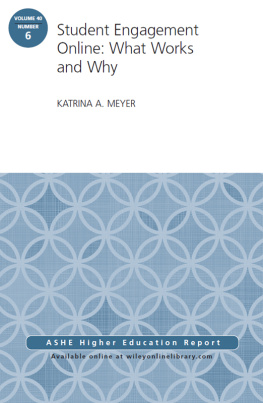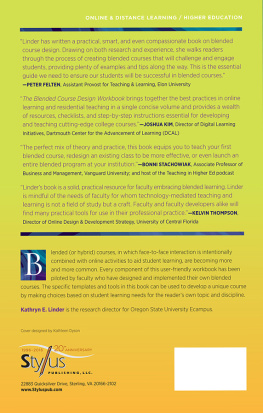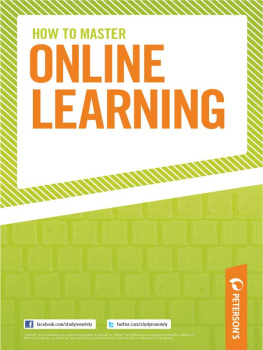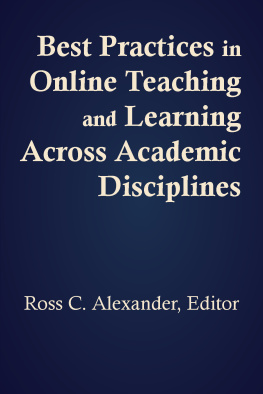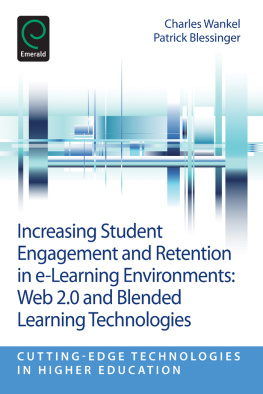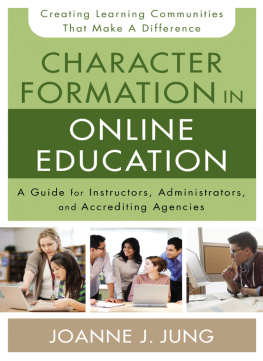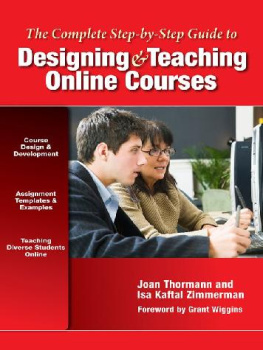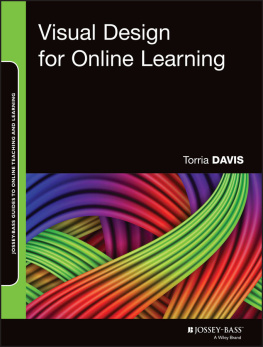
Student Engagement Online: What Works and Why
Katrina A. Meyer
ASHE Higher Education Report: Volume 40, Number 6
Kelly Ward, Lisa E. Wolf-Wendel, Series Editors
Copyright 2014 Wiley Periodicals, Inc., A Wiley Company. All rights reserved. Reproduction or translation of any part of this work beyond that permitted by Section 107 or 108 of the 1976 United States Copyright Act without permission of the copyright owner is unlawful. Requests for permission or further information should be addressed to the Permissions Department, c/o John Wiley & Sons, Inc., 111 River St., Hoboken, NJ 07030; (201) 748-8789, fax (201) 748-6326, www.wiley.com/go/permissions.
Cover image by Anastasia Ku/iStockphoto
ISSN 1551-6970 electronic ISSN 1554-6306 ISBN 978-1-119-00075-4
The ASHE Higher Education Report is part of the Jossey-Bass Higher and Adult Education Series and is published six times a year by Wiley Subscription Services, Inc., A Wiley Company, at Jossey-Bass, One Montgomery Street, Suite 1200, San Francisco, California 94104-4594.
Individual subscription rate (in USD): $174 per year US/Can/Mex, $210 rest of world; institutional subscription rate: $352 US, $412 Can/Mex, $463 rest of world. Single copy rate: $29. Electronic onlyall regions: $174 individual, $352 institutional; Print & ElectronicUS: $192 individual, $423 institutional; Print & ElectronicCanada/Mexico: $192 individual, $483 institutional; Print & ElectronicRest of World: $228 individual, $534 institutional. See the Back Issue/Subscription Order Form in the back of this volume.
CALL FOR PROPOSALS: Prospective authors are strongly encouraged to contact Kelly Ward (). See About the ASHE Higher Education Report Series in the back of this volume.
Visit the Jossey-Bass Web site at www.josseybass.com.
The ASHE Higher Education Report is indexed in CIJE: Current Index to Journals in Education (ERIC), Education Index/Abstracts (H.W. Wilson), ERIC Database (Education Resources Information Center), Higher Education Abstracts (Claremont Graduate University), IBR & IBZ: International Bibliographies of Periodical Literature (K.G. Saur), and Resources in Education (ERIC).
Advisory Board

The ASHE Higher Education Report Series is sponsored by the Association for the Study of Higher Education (ASHE), which provides an editorial advisory board of ASHE members.
- Ben Baez
- Florida International University
- Amy Bergerson
- University of Utah
- Edna Chun
- University of North Carolina
Greensboro
- Susan K. Gardner
- University of Maine
- MaryBeth Gasman
- University of Pennsylvania
- Karri Holley
- University of Alabama
- Adrianna Kezar
- University of Southern California
- Kevin Kinser
- SUNY Albany
- Dina Maramba
- Binghamton University
- Robert Palmer
- Binghamton University
- Barbara Tobolowsky
- University of Texas at Arlington
- Susan Twombly
- University of Kansas
- Marybeth Walpole
- Rowan University
- Rachelle Winkle-Wagner
- University of Nebraska Lincoln
Executive Summary
Why Engagement?
With more students needing a higher education and less resources available from the states, the productivity of higher education institutions has become of greater interest to state governments, national foundations, and other assorted groups. Given its importance to individuals and the economy, President Obama has stressed the need for higher education to control its costs and produce more and better graduates. By moving academic programs and coursework online, higher education institutions must ensure that students succeed in their online programs.
Given the highly visible research on the National Study of Student Engagement (NSSE) and what it has revealed about engagement in the facetoface environment, it makes sense to investigate the ways that engagement strategies can keep students enrolled in their online programs to completion and ensure they are learning what they need to succeed. This monograph presents the research on student engagement online and draws recommendations for instructors designing or teaching an online course.
Are There Limits to Engagement?
Students lives tend to present serious limits to what can be achieved with engagement strategies. They have employment or family demands that force them to attend parttime or they may be inexperienced students and need to learn how to learn or to understand the basics of online learning. They may need to develop selfregulatory behaviors, motivation to succeed, and the ability to defer gratification. They may also have to develop an understanding of and skills for active learning and find time and willingness to put effort into their learning.
Instructors also sometimes act in ways that impinge on student engagement, by offering poorly designed online courses, dominating course interactions, and being unclear about the educational goals of course activities and what students are expected to achieve. These instructors may need to improve their online teaching skills or their understanding of how students learn; this may involve examining their expectations of what instruction is and what it is that instructors do to bring learning about.
What Works to Increase Student Engagement in Online Coursework?
The main goal of the monograph is to identify the approaches or techniques that have been proven to increase engagement. To achieve this goal, the monograph draws upon learning theories and research studies conducted in online learning courses and also some facetoface situations.
Use Learning Theories That Encourage Engagement
Put simply, engagement strategies work because they are based on learning theories that stress student activity rather than passive learning. Active learning, collaborative learning, authentic and experiential learning, as well as several other theories that focus on getting the student to do somethingbe it cognitive or physicalwork to engage them in their learning. These learning theories are why engagement works.
Focus on Pedagogies and Active Learning Options
Pedagogies that stress student effort or work tend to engage more effectively. That means using assignments that ask students to do somethingsuch as work in a group, solve a problem, prepare a project, and experience a situationwill more likely produce student engagement in his or her learning.
Interact for an Educational Purpose
Be it for online discussions, group work, or simple email exchanges, students need to know the goal and reason for the assignment. Instructors need to provide not only the goal, but also the rationale for the assignment, explaining what it will help students learn and why it is being done in this way.
Push Students to Think More Deeply
Whether in the design of assignments, directions to students about the assignments, or the evaluation criteria for students work, instructors need to ask questions, critique student responses, and provide additional context for the learning. Instructors also need to show students what deep thinking is.
Teach Students How to Learn
Next page
